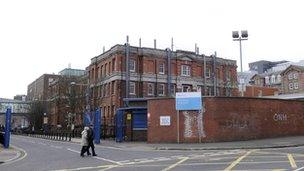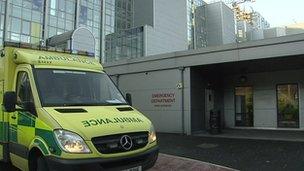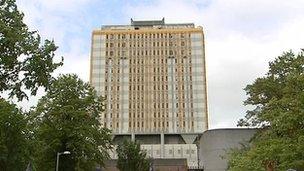Belfast Health Trust consultants raise A&E safety concerns
- Published

A&E consultants have raised concerns about patient safety as pressures mount over the winter months
The BBC has learned that almost all of emergency medicine consultants in the Belfast Health Trust have raised concerns with management about the safety of A&E departments.
In another dramatic move, the clinical director of the Royal Victoria Hospital (RVH) has decided to step aside.
It is understood Dr Russell McLaughlin did so because he feels strongly about how A&E departments are being run.
The Belfast Trust said the consultants' concerns have already been addressed.
Dr McLaughlin is understood to be concerned about the running of the A&E at the Mater and RVH hospitals.
Stepping aside will mean a 20% cut in his salary.
Dr McLaughlin has been clinical director of the Royal's A&E department for almost four years.
'Mounting pressures'
BBC Northern Ireland understands that he is stepping aside from the role because he is unhappy about managing an overly stressful environment, where it is perceived that both patients and staff are constantly being put at risk.
He is also concerned about what he believes is a lack of additional money and forward planning that has gone into moving emergency services from Belfast City Hospital to the RVH site.
The RVH and the Mater Hospital have taken on additional workload since Belfast City Hospital's A&E department closed just over a year ago, due to a shortage of senior staff.
Dr McLaughlin is one of 15 emergency medicine consultants who work between the RVH and the Mater.
While the clinical director did not wish to comment directly to the BBC, other medics who work in both hospitals said while they are disappointed at his decision it is hardly surprising considering the mounting pressures he and his staff are facing.
'Angry'
They wrote to senior managers about the lack of forward planning for the looming winter months.
Consultants have told the BBC there are also concerns over staffing the emergency department, covering holiday and sick leave, and the fact that the rest of the hospital system does not follow a seven-day working pattern shift, which has a knock on effect especially at the weekends.
They are also angry at how management dealt with the circumstances following the death of a pensioner on a hospital trolley earlier this year in the RVH's emergency department.

Earlier this month, the RVH and Mater reported a higher than normal number of A&E patients
A majority of the consultants said that, prior to the incident, they had raised safety concerns with management and had warned of a "catastrophe waiting to happen".
It is just the latest in a long line of correspondence which includes letters and emails to both the chief executive of the Belfast Health Trust, Colm Donaghy, and its medical director, Tony Stevens.
Dr Stevens said the concerns raised by the consultants have been addressed.
"Our consultants, our clinical teams have been working over the summer to get ready for this winter," he said.
"There's been a huge amount of forward planning. We've opened a direct admission unit for GPs, we've expanded the size of our medical admission unit.
"We've introduced all consultants, not just in the emergency department, consultants working in the evenings as well as in the mornings, to make sure that there is senior decision making in the evenings."
'A joke'
However despite the heavy paper trail, consultants have told the BBC that they feel their concerns are being ignored and the only objective is to save money.
One consultant who has worked in the Belfast Health Trust for several years says the Health Minister, Edwin Poots, is not being made aware of the true picture.
Not wishing to give their name, the consultant said: "When there is a visit from the health minister or any official - it's like preparing for royalty arriving. In fact we welcome such visits because it ensures the place is cleaned and the rotas fully staffed.
"The place is a joke, managers have no idea. We believe Edwin Poots is being shielded from the truth."
In a separate email sent in 2010, the consultants question why there is no feedback from the trust's medical director, Tony Stevens.
They ask for some recognition from senior trust level to acknowledge that their concerns, and the high number of incident report forms, are being taken seriously.
"There has been no feedback from the director Tony Stevens… we want recognition from senior trust level to acknowledge these incident report forms are being taken seriously with a view to solutions and that they are not just falling into a black hole," they said.
'Reassurance'
Highly respected among his peers, Dr McLaughlin will continue working as an emergency medicine consultant but will not be in charge of directing a team of staff.

Belfast City Hospital's A&E department closed last November due to senior staff shortages
The BBC asked the Belfast Health Trust to comment on the reaction from the emergency department consultants.
In a statement, the trust said it was "working closely with Health and Social Care Board in providing additional resources over the winter when the greatest pressure is usually felt with plans about to be put in place.
"In the emergency department itself, we have been working with staff to ensure that we take full account of the pressures that are being experienced with a piece of diagnostic work agreed to begin in the coming weeks.
"For those patients who need to be admitted we have already expanded our acute medical admissions ward where we can investigate and intervene quickly with patients to ensure their speedy and safe return home."
The trust said it was "confident" that it could provide "reassurance that the winter ahead will be well managed with the dedication and engagement of all the staff in the Belfast Trust".
- Published19 November 2012
- Published13 November 2012
- Published7 August 2012
- Published15 March 2012
- Published1 November 2011